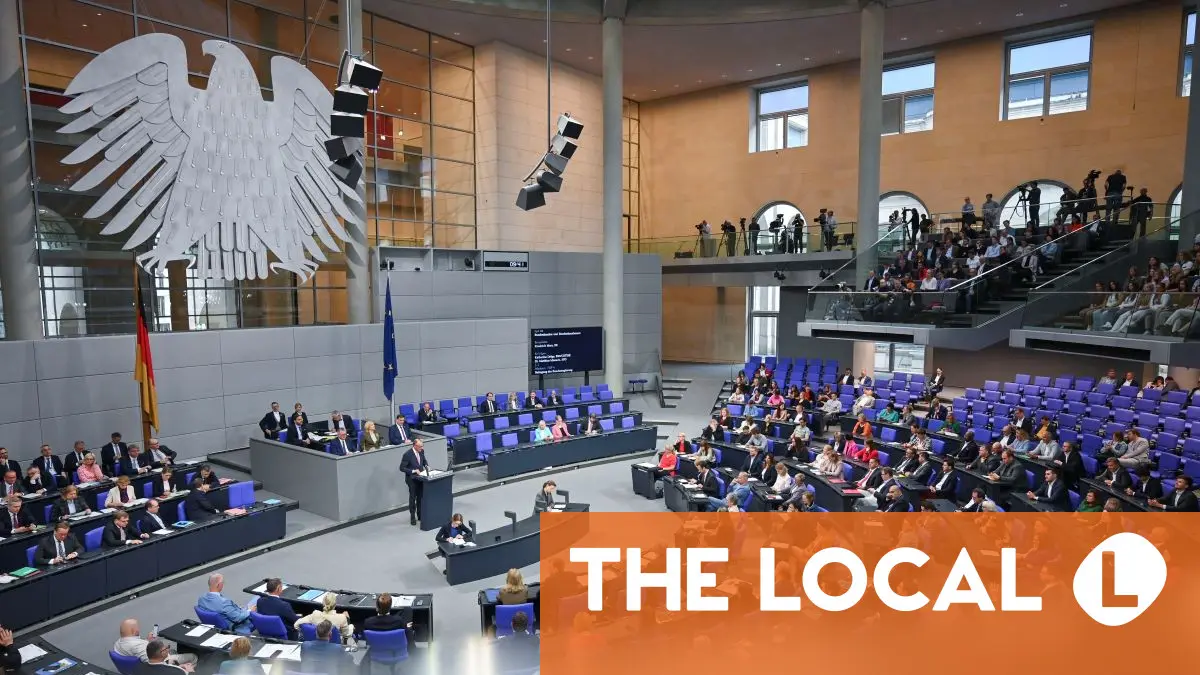What is the General Debate?
Among the Bundestag’s prominent traditions is the Generaldebatte (general debate)– an open debate held several times a year, and most notably during the budget process.
Partly a showcase for the government’s policies, the Generaldebatte is also meant to be an opportunity for opposition parties to hold the government to account.
The July debate opened on Wednesday and was initially focussed primarily on the budget for 2025.
Chancellor Merz of the conservative Christian Democrat (CDU) party said that his government’s plans had initiated a turnaround in economic policy and laid the foundation for further investment.
Merz stressed that substantial borrowing was necessary in order to invest in defence and major improvements to infrastructure in Germany.
AfD opened the debate
By convention, the leader of the largest opposition party is invited to open the debate, before handing over to the Chancellor.
This meant that Alice Weidel of the far-right Alternative for Germany (AfD) party was the first speaker on Wednesday. True to form, she wasted no time in turning to her favourite topic: immigration.
To applause from her party members, she suggested that rapes and knife attacks committed by immigrants were an everyday part of life in Germany.
According to reporting by Welt, Weidel took aim at Bürgergeld (citizens’ allowance), and suggested that immigrants are taking “money that does not belong to them”.
Advertisement
The AfD leader continued with a series of wild claims about how much money immigrants in Germany are collecting. Figures that she stated in her speech were “grossly wrong” according to a report by RTL/ntv.
Co-leader of the far-right AfD party, Alice Weidel, gives a speech as Chancellor Friedrich Merz and Finance Minister Lars Klingbeil (L) look on during the general debate on the German budget. (Photo by Odd ANDERSEN / AFP)
The AfD has made Germany’s Bürgergeld benefit, and its alleged use by immigrants, a particular focus recently. As we reported last week, the party inquired about the most common first names of Bürgergeld recipients only to find out that Michael, Andreas and Thomas took the top three spots.
The Chancellor’s response
When it was his turn to speak, Chancellor Merz failed to meaningfully challenge Weidel’s statements about the burden placed on Germany’s welfare statement system by immigrants.
Instead, he defended his government’s policies on immigration, emphasizing the reduction in asylum applications and promising to reduce “irregular migration” further.
In the end, it was Weidel who called Merz a “lying Chancellor” (Lügenkanzler), whereas Merz merely spoke about “half-truths, slander, and personal disparagement.”
Immigrants and welfare debate
Merz’s failure to correct the AfD leader illustrates an ongoing misrepresentation of the relative financial costs and benefits of migration in German politics and the media.
READ ALSO: ‘I’ve never felt welcome’ – Why immigrants are leaving Germany
This spring, a study by economist Bernd Raffelhüschen made headlines when Bild splashed its findings across its front page under the heading: “Explosive migration study – this is how much migration really costs us.”
The figure cited – €5.8 trillion – was seized on by politicians and commentators as proof that migration is an unsustainable burden.
The study was taken wildly out of context, however, as Raffelhüschen himself acknowledged.
German media largely failed to report, for example, that the generational accounting method used in his study also labelled new-born Germans as a “loss-making business” for the welfare state.
What’s the real cost / benefit of migration?
Other economists, whose studies are designed to make sense of the relative costs and benefits of immigration have come to very different conclusions.
Martin Werding, a government economic advisor and professor at Ruhr University Bochum, subsequently produced a study in which he estimates that the German state will save around €100 billion per year between now and 2070 because of immigration.
Advertisement
Werding’s findings are echoed in his 2025 report, which says, “The contributions paid in exceed the benefits claimed…In the long term, immigration is indispensable for the viability of the welfare state.”
An investigation carried out by the podcast Einwanderungsland also backs up these findings.
Immigration is crucial to the viability of Germany’s welfare state
The bottom line, according to the best studies on the topic is as follows:
Refugees and migrants who aren’t immediately integrated into the workforce draw on social benefits in Germany, and cost the state an estimated €30 billion per year.
Most migrants come to Germany to work or study, however, and around two-thirds of foreigners in Germany are employed. Also the longer immigrants stay in the country, the more likely they are to have a job.

A woman clicks on an online application for Bürgergeld, Germany’s long-term unemployment benefit. Photo: picture alliance/dpa | Carsten Koall
Even among refugees, two-thirds of those who arrived in 2015 are now employed.
The fiscal picture improves rapidly as migrants enter the workforce. Highly qualified immigrants, such as engineers, generate substantial tax and social security revenue, and even less qualified workers provide a net benefit.
READ ALSO: How generous is Germany’s unemployment benefit system?
Added to which, immigration is now the sole driver of employment growth in Germany.
According to the Federal Employment Agency, the entire increase in jobs subject to social insurance contributions in 2024 was due to foreign workers. Sectors like tourism would collapse completely without them.
Advertisement
The debate around immigration in Germany will continue, and unfortunately as long as anti-immigration politics remain popular, the debate will likely remain largely misguided.
Despite the impression given during today’s Generaldebatte, however, the evidence increasingly points to an inescapable truth: the future viability of Germany’s welfare state isn’t being put at risk by immigrants.
On the contrary, it depends on them.





































